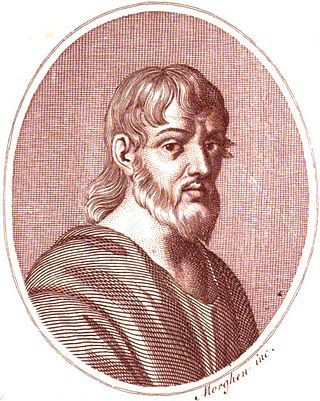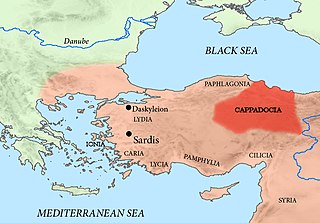Related Research Articles

Alexander III of Macedon, most commonly known as Alexander the Great, was a king of the ancient Greek kingdom of Macedon. He succeeded his father Philip II to the throne in 336 BC at the age of 20 and spent most of his ruling years conducting a lengthy military campaign throughout Western Asia, Central Asia, parts of South Asia, and Egypt. By the age of 30, he had created one of the largest empires in history, stretching from Greece to northwestern India. He was undefeated in battle and is widely considered to be one of history's greatest and most successful military commanders.

Alexander II was a king of Epirus, and the son of Pyrrhus and Lanassa, the daughter of the Sicilian tyrant Agathocles.

Alexander IV, sometimes erroneously called Aegus in modern times, was the son of Alexander the Great and Princess Roxana of Bactria.
Parmenion, son of Philotas, was a Macedonian general in the service of Philip II of Macedon and Alexander the Great. A nobleman, Parmenion rose to become Philip's chief military lieutenant and Alexander's strategos. He was assassinated after his son Philotas was convicted on a charge of treason. His siblings Asander and Agathon would also become prominent members of Alexander's Macedonia.
Amyntas IV was a titular king of the Hellenistic kingdom of Macedonia in 359 BC and member of the Argead dynasty.

Balakros, also Balacrus, the son of Nicanor, one of Alexander the Great's "Somatophylakes" (bodyguards), was appointed satrap of Cilicia after the Battle of Issus, 333 BC. He succeeded to the last Achaemenid satrap of Cilicia, Arsames.

Asander or Asandros was the son of Philotas and brother of Parmenion and Agathon. He was a Macedonian general under Alexander the Great, and satrap of Lydia from 334 BC as well as satrap of Caria after Alexander's death. During Alexander's reign Asander's position suffered for a period following Parmenion's execution, he was sent to Media to gather reinforcements during this time, and a year later was sent to Bactra.

Taxiles or Taxilas was the Greek chroniclers' name for the ruler who reigned over the tract between the Indus and the Jhelum (Hydaspes) Rivers in the Punjab region at the time of Alexander the Great's expedition. His real name was Ambhi, and the Greeks appear to have called him Taxiles or Taxilas, after the name of his capital city of Taxila, near the modern city of Attock, Pakistan.

Barsine was the daughter of a Persian father, Artabazus, satrap of Hellespontine Phrygia, and a Greek Rhodian mother, the sister of mercenaries Mentor of Rhodes and Memnon of Rhodes. Barsine became the wife of her uncle Mentor, and after his death married her second uncle, Memnon.
Ptolemy son of Seleucus from Orestis or Tymphaia, was one of the select officers called Somatophylaces, or guards of the king's person; he combined with that distinguished post the command of one of the divisions of the phalanx. Ptolemy was from an upper noble family. He was lately married when he accompanied Alexander on his expedition to Asia, 334 BC, on which account he was selected by the king to command the body of Macedonians, who were allowed to return home for the winter at the end of the first campaign. In the following spring he rejoined Alexander at Gordium, with the troops under his command, accompanied by fresh reinforcements. At the Battle of Issus his division of the phalanx was one of those opposed to the Greek mercenaries under Darius III, and upon which the real brunt of the action consequently devolved; and he himself fell in the conflict, after displaying the utmost valour.

Acron, son of Zeno of Elea, was a Greek physician born at Agrigentum in Magna Graecia.

Stateira was a queen of Persia as the wife of Darius III of Persia of the Achaemenid dynasty.

Abistamenes was a governor, or satrap, of Cappadocia, or at least of its southern portions, with Ariarathes I of Cappadocia possibly governing the north. He is called Sabictas by Arrian, and was almost certainly a native Cappadocian.

The Aleuadae were an ancient Thessalian family of Larissa, who claimed descent from the mythical Aleuas (Ἀλεύας). The Aleuadae were the noblest and most powerful among all the families of Thessaly, whence Herodotus calls its members "rulers" or "kings" (βασιλεῖς).
Thessalus, a physician from ancient Greece, and the son of Hippocrates, the famous physician. He was the brother of Draco, and father of Gorgias, Hippocrates III, and Draco II. He lived in the 5th and 4th centuries BC and passed some of his time at the court of Archelaus I of Macedon,. He was one of the founders of the Dogmatic school (Dogmatici) of medicine, and is several times highly praised by Galen, who calls him the most eminent of the sons of Hippocrates, and says that he did not alter any of his father's doctrines. No doubt when he performed the difficult task of preparing the writings of Hippocrates for publication after his death he made some additions of his own, which were sometimes not quite worthy of that honour. He was also supposed by some of the ancient writers to be the author of several of the works that form part of the Hippocratic collection, which he might have compiled from notes left by his father.
Thessalus of Tralles was a famous Roman physician and early adherent to the Methodic school of medicine. He lived in Rome, where he was the court physician of Emperor Nero. It was here that he died and was buried, and his tomb was to be seen on the Via Appia.
Draco was the name of several physicians in the family of Hippocrates.

Menes of Pella, son of Dionysius, was one of the Greek officers of Alexander the Great; and after the Battle of Issus was admitted by the king into the number of his somatophylakes, in the place of Balacrus, who was promoted to the satrapy of Cilicia.
Athenodorus was a tragic actor, victor at the Dionysia in 342—in the Antigone of Astydamas—and 329 BC. He performed also at the games after the victorious siege of Tyre in honour of Heracles in 331 BC, with the Cypriot Pasicrates of Soli being his choregos, and was victorious over Thessalus, whom Nicocreon of Cyprus supported and Alexander himself favored. Soon afterwards he returned to Athens, as his Dionysiac victory of 329 shows. At some point Athenodorus was fined by the Athenians for failing to appear at the festival, and he asked Alexander to intercede in writing on his behalf; Alexander instead paid his fine. In 324 Athenodorus reappears at the Susa wedding festival, along with Aristocritus and Thessalus.
Xenophon of Corinth, son of Thessalus, was a victor at the Olympic Games, both in the foot-race and in the pentathlon, in the 79th Olympiad. His family belonged to the stock of the Oligaethidae, and was one of the ruling families of Corinth. Pindar's 13th Olympic Ode celebrates his double victory.
References
- ↑ Hanink, Johanna (2014). Lycurgan Athens and the Making of Classical Tragedy. Cambridge University Press. p. 184. ISBN 9781139993197 . Retrieved 2024-08-21.
- ↑ Plutarch , Parallel Lives , "Life of Alexander" 29 ( ed. Clough 1859 ; ed. Loeb ).
- Who's who in the age of Alexander the Great: prosopography of Alexander's empire ISBN 978-1-4051-1210-9
![]() This article incorporates text from a publication now in the public domain : Smith, William (1870). "Thessalus". In Smith, William (ed.). Dictionary of Greek and Roman Biography and Mythology .
This article incorporates text from a publication now in the public domain : Smith, William (1870). "Thessalus". In Smith, William (ed.). Dictionary of Greek and Roman Biography and Mythology .